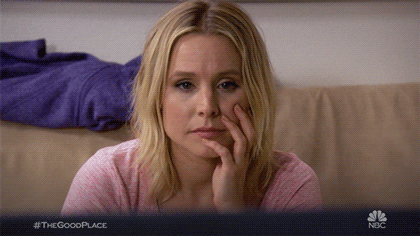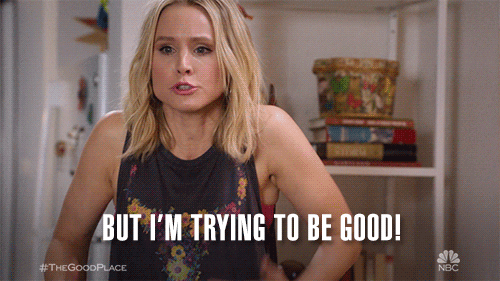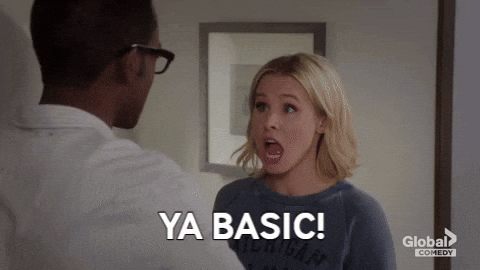Media as a teacher, part 1.
Netflix’s Explained is a documentary series that attempts to…well, explain, a world issue (like the water crisis, or political correctness) in 20 minutes. This has been my quality mother-daughter time lately. We coincide and watch an episode or two of Explained and perhaps discuss the issue ourselves. The show tries not to give an openly biased posture on most issues, but rather show the facts and let you decide what to think. Although admittedly, sometimes the creators’ point of view shines through.
It has been interesting to see this with my mother, who tends to gravitate to more clearly moralistic content. She likes to watch things with a “message”, by which she means a moral lesson in the style of a fable.
For a long time, I have rolled my eyes at this. She disapproves of me watching television that just “won’t leave anything good”, specifically things that are sexually or violently charged, like Game of Thrones or Orphan Black (granted, I’d have to agree with her on GoT). I argue that television, and film for that matter, is not obligated to teach us lessons. In find, when it tries, I find it pedantic and sometimes even condescending.
But even as I write that I realize it’s a bit hypocritical of me. Because film and TV and the conversations surrounding them has taught me a lot. About respect, diversity. I learned about non-binary with Carmilla. And the representation of a trans character in Orange Is the New Black led me to get informed about trans issues and rights. I learn a lot on Explained, because the show usually gives you the two sides of the story on controversial issues. And I find that important, just like I find fair representation and diversity and women’s empowerment important, especially on media. All of this certainly sends a “message”. Furthermore, even as I’ve said on this site, I think that there is an inherent responsibility in being a media creator.
Oh. Oh no. I’m a hypocrite, aren’t I?
Is there really a difference between my mom’s way of thinking and mine? Is it just that I don’t agree with the messages my mother likes, but I support moralistic lessons from things I agree with? Film and especially television undeniably have the power to teach us things. Sometimes even to teach us life lessons. But should it? Should it try?

Media as a teacher?
Media as a teacher is an issue widely discussed, especially when it comes to children’s and Young Adult media. Films and especially television, because of its constant presence in our homes, has been scrutinized for child or family-friendly content. This of course, based on the opinion of parents.
Is Steven Universe something kids should watch? You could find two wildly different opinions out there, but the internet is certainly inclined to think that the show is positive for kids—an opinion I share. This is because the power to (try to) dictate public opinion shifted some years ago, and slowly, media representation is shifting with it. Granted, some faster than others, but as the generational shift of toddler’s parents changes definitively, so will inevitably the media made for children.
But is it the media’s responsibility to teach young people things? It’s a tough question to answer, and to try might be to get a little bit too much into parenting, on which I have no business having opinions.
Adults Need Schooling Too
The thing is, I could say that if I’ve learned anything from film, TV or books, it has been in my adulthood. Even things I watched as a kid, I’ve only just deciphered what they meant as I revisited them years later.
I got close to nothing from The Little Prince as a 10-year-old, but when I reread it as a 20-year-old, I could have written a dissertation on everything it got me thinking about. And herein lies the clue. I don’t think I directly learned anything from The Little Prince. Not in the traditional “I teach, you absorb” way. It was more that it caused me to feel many things and that got me thinking about those feelings and the reason for them.
Antoine de Saint-Extupéry clearly had some opinions about childhood, and what it is about it we should treasure. I can’t say I share his opinion one-hundred percent, but I see where he was coming from, and didn’t find his writing too preachy.
Another excellent example is The Good Place, in which moral philosophy classes are outright taught to the protagonist, Eleanor, in order to learn to be a good person. But within the show, its creator (Michael Schur) and writers don’t present an absolute decision on what constitutes being a good and a bad person. They simply present you with the different theories (literally!), dilemmas that the characters solve for themselves based on their particular situation, and an invitation for us to ruminate it further.
Preaching a Moral or Exposing Points of View?
According to Oxford Dictionaries (2018), a moral is “a lesson that can be derived from a story of experience”, related to the adjective which is “concerned with the principles of right and wrong”, you get a lesson about what is right and wrong, derived from a story.
Everyone has an idea of what is right and wrong. I don’t believe it is possible for any author, of any kind of work of fiction to be objective. Point of View is a thing, and something that you cannot help but have in anything, and whose point of view you choose says a lot about you as a creator.
Why is Harry Potter from Harry’s point of view? Why choose the detectives or the criminals in a mystery? Why Piper in Orange Is the New Black? Why Sarah as the main clone in Orphan Black? Choosing every single one of these points of view is telling. It’s about the story you want to tell. The difference is when you accept your point of view as just that, as opposed to declaring your point of view as right, and preaching to your audience what is objectively right and wrong.

When an author shows a point of view, while they’re trying to get us to sympathize, they’re not necessarily pushing those character’s opinions on us, or trying to get us to support their decisions.
Take Orange Is the New Black (OItNB). Piper Chapman is one of the most universally hated protagonists in recent television memory. There are plenty of fans of the show who’d rather watch someone else lead it. Yet part of the reason it worked so well, especially in its early seasons, is because of who Piper is. A privileged white woman trying to equate herself to minorities and tortured criminals is as annoying as it sounds, and I don’t believe it was ever meant to be another way. It’s like the writers want us to hate her. And ourselves a little bit, when we are as short sighted as Piper.
That is if you let yourself see your own behavior in Piper (when applicable). It is not a requirement, and at no point does a narrator’s voice come on to tell you “and that kids, is why being privileged makes you myopic”. No. It’s just showing us a point of view that we can either agree with or not.
Show (me what you think), Don’t Tell (me what to think)
To put it another way, there is a different with a creator showing us what they think is right and wrong, and them telling us what is right and wrong, period.
Films like God’s Not Dead do the latter. Hallmark movies are also notable for this. What these films tend to have in common is that they almost always have a protagonist who is irreproachable in their actions. They are good to the bone, and everything they do is righteous, even if others don’t understand. I personally find it very hard to relate to these characters. They simply do not feel real to me.

I do like characters that conscientiously so selfish or mean things sometimes, because that is much more human. Orphan Black’s Sarah Manning is volatile and often acts irrationally. The narrative presents her ugly side just the same as her goodness and willingness to help others, and that makes her realer to me even if she is a clone. Another example is BBC’s Fleabag, which did an extraordinary thing by presenting the point of view of a truly damaged woman and getting us to sympathize with her while disagreeing with practically every single decision she made. She’s human in the most tragic sense, and her pain is inescapable.
Show me people, don’t tell me what to think of them, is what I ask for in stories. But also, please show me all kinds of people. Brown, black, Asian, LGBT+, women, lots and lots of women, young, middle-aged, old. Stop leaving people out of representation, because that, in my opinion, sends a bad message.
The Messages We Support
Ultimately, though I sustain my dislike for media that is too preachy, I do recognize that I do look for a certain message in film. And the fact is, my biggest problem with my mother’s tendencies to go for “good messages” is that I don’t agree with some of her more traditional ideas of what is good and bad—as is natural with generational changes. The truth is, I do like film and television to promote certain ideas that I find good, and denounce things I consider bad.
I like that Steven Universe normalizes LGBT+ relationships for children, as an example. I am glad that more and more shows are representing trans people in fairer ways (though we still have a long way to go). It’s great that women are represented in more varied roles. Because this is what I believe is right. Representation, acceptance, diversity. I do believe creators and writers must be conscientious about the message they are sending to their audience, and particularly to minorities.
There are many things about which my mother and I agree. I love her being happy when movies star middle-aged or elderly people, because they and their issues are underrepresented. Their stories—my mother’s story now—are just as valuable as young people’s stories. But there are things in which we don’t see eye to eye and I’ve accepted that it will never happen. Unconventional families, depiction of violence and sex in media, religion, among other (more touchy) topics.
So the answer is: yes, I am kind of a hypocrite. My mother’s generation fought for their message to be accepted and transmitted in media. And now some of those have become retrograde. I think it’s inevitable that many many years from now, a new generation will call me retrograde, and I’ll probably stick to my guns regarding my opinion of media. They’ll take charge of public opinion, and change media in ways it’s impossible for us to imagine right now. And so on, ad infinitum.
But Should It Try, Though?
The question still stands: Should media be trying to teach something?
I go back to what Lajos Egri said in The Art of Dramatic Writing (2004), that an author must necessarily pick sides in order for the work to be any kind of meaningful. I sustain that whether you intend to or not, as a writer you are taking a stance. You must stand for something. Beliefs and morals come through in the narrative even if we try our hardest to fight it.
But I also believe there is a difference between your ideas coming through, and trying to impose your ideas on your audience. Most works that do this bluntly appeal only to those who already share the same opinions as the work is trying to “teach” (see: God’s Not Dead).
And even still, it’s not as simple as that. Because we are a part of this equation as well. The audience!
What are we demanding of our media? I partly answered that question for myself before. But it is notable that audiences in general nowadays are very scrutinizing when it comes to the content of media. There must be diversity and it must be represented in just the right way to fit their ideals and values. This almost to the point where it’s impossible to write any story that fits these sky-high standards.
Where Do We Come In?
Media literacy comes into play. Why are we so intent on stories in media being cooked to near-perfection? Should it have to be that way? Is there no room for creators to make mistakes?
One fine example of this is the internet obsession with “Healthy Ships”. Basically, the idea that romantic relationships depicted and endorsed on film and TV should be healthy. In the extreme, this ideal doesn’t allow for the sympathetic depiction of toxic relationships, or even slightly unhealthy ones. This stance assumes people are incapable of separating fiction for reality. That we are so easily influenced that we would pursue a toxic relationship as consequence. Shouldn’t we have the capacity to discern, analyze and discuss? And that… is a whole other beast. that I will talk about in the next part of this series.
In the end, I still believe that no, media and particularly stories in media (film, TV) should not try to preach an ideal morality to its audience. Simply because there are no absolutes in right and wrong. But what it should do, is present as many perspectives and points of views as possible.
Images courtesy of NBC.
Sources cited:
Egri, L. (2004). The Art of Dramatic Writing: its basis in the creative interpretation of human motives. 1st ed. New York: Touchstone.

